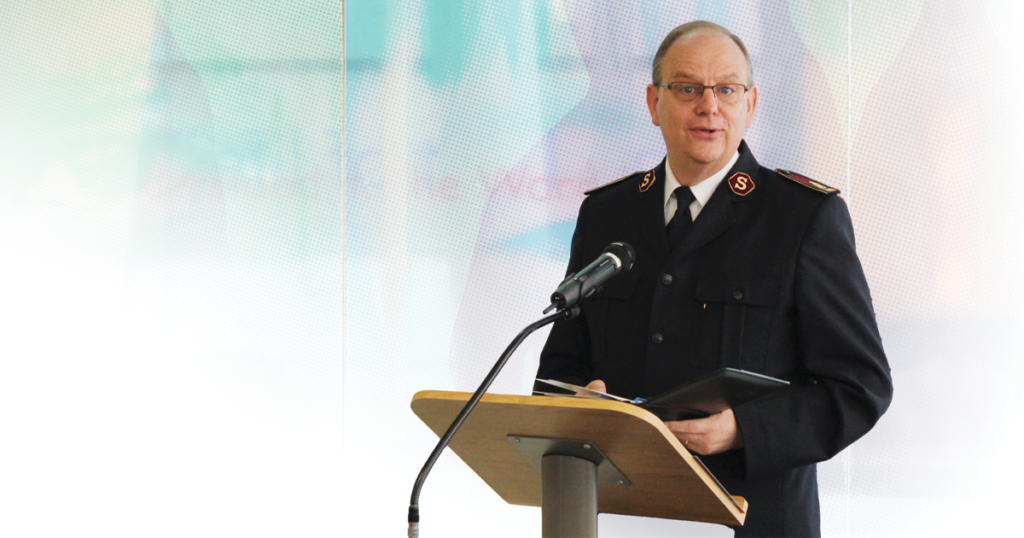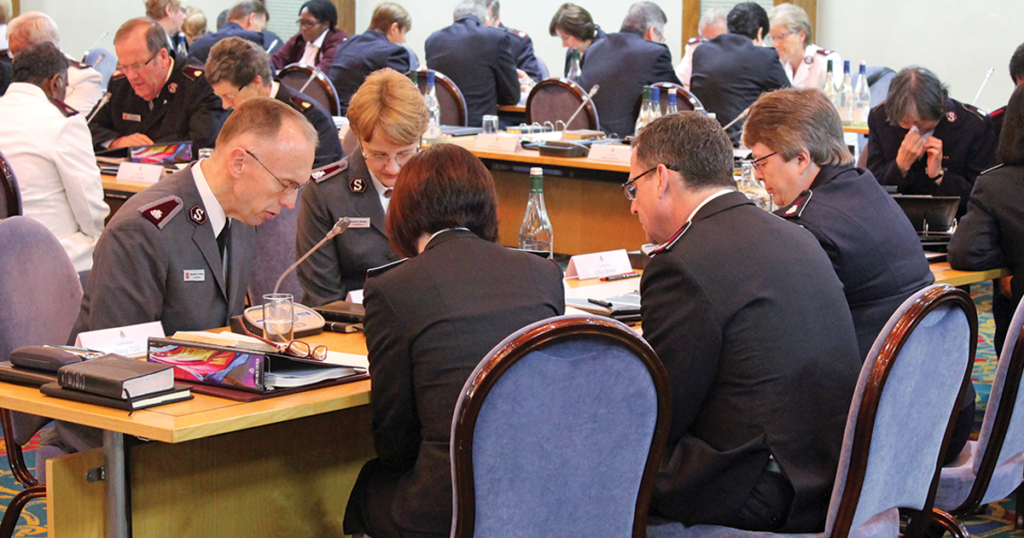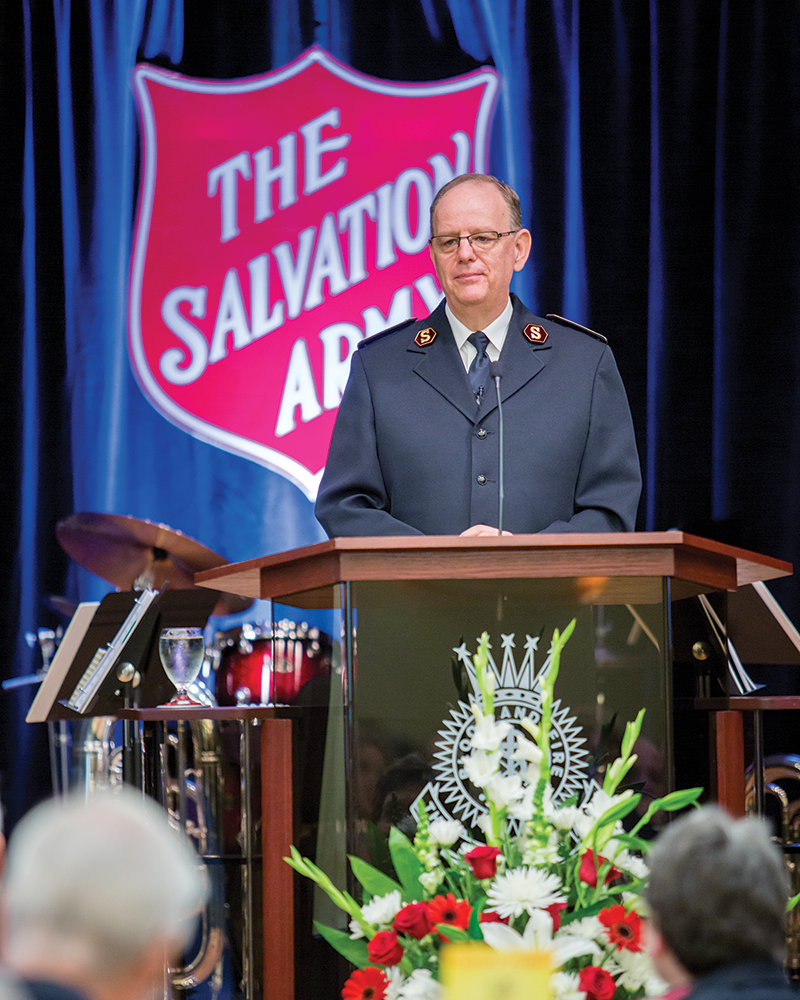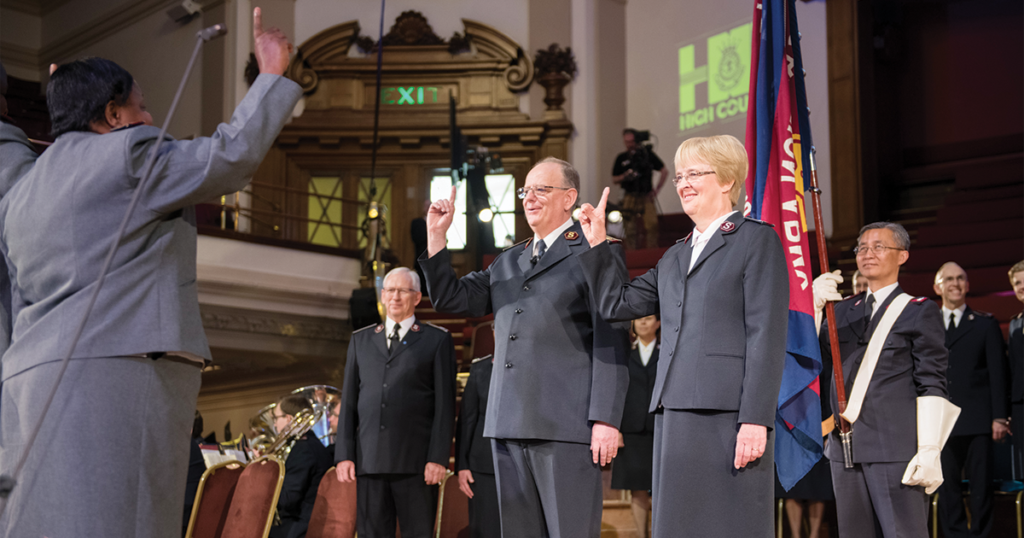A Sacred Responsibility
An interview with General André Cox (rtd). André Cox was General from 2013-2018. He and Commissioner Silvia are retired in Switzerland.
War Cry: Can you describe how a High Council works and what happens during a High Council?
General André Cox: The High Council’s only function is to elect a world leader for The Salvation Army. It’s very different from anything business related or a conference of leaders.
First and foremost, it’s a sacred meeting. It is a meeting that is, more than any other meeting within The Salvation Army, bathed in prayer.
Once the High Council begins, the Chief of the Staff will lead a time of worship and prayer to start the proceedings and then appoint temporary tellers whose purpose is to count the nominations and votes for president, vice president and chaplain.
Then, a questions committee is elected. They develop a core questionnaire for the candidates to present to the High Council, usually the next morning. The questionnaire is unique to every High Council. It relates to the present situation of The Salvation Army and the challenges going forward.
The first step in identifying the candidates is for every member to write a name on a piece of paper. These are gathered up and the tellers will determine how many people are eligible to stand as a candidate.
Once that process is clear, the High Council will break for up to 24 hours, during which time each candidate must answer the questionnaire and has the opportunity to write a speech. They’re given a deadline by which they have to submit their written answers and speeches to the administration of the High Council.
Once those documents are sent, it is not possible for a candidate to change a comma, a word or anything.
Each of the candidates’ names is put into a hat and drawn by lots and they speak in that order.
High Council members are strictly told that there is to be no manifestation whatsoever during the questions or speeches. In a typical Army gathering, you may have “Amens” and “Hallelujahs,” but not in the High Council. The candidates read the written answers to their questions and each High Council member has a transcript of what they wrote. If you didn’t write it, you can’t say it.
It’s quite a unique experience because you speak to a congregation where there is no response whatsoever. So, you have no idea of the impact of any particular answer.
The questionnaire usually is at least 40 or more questions, so that process takes quite a bit of time, and it requires discipline from the High Council members to be attentive, to be alert, to listen.

Following that, again, the lots are drawn as to the order of who will give their speeches first. There’s no limit on the time they can speak. Usually, those speeches are fairly concise, but still require a lot of effort from the High Council members to be listening, bearing in mind that some are being translated. English is not the first language of the majority of our leaders, so it’s quite a demanding exercise for all involved.
After all of that, then the voting can begin. With 110 up to 120 people in the room, that can take a bit of time. If you started voting in the morning, it is possible [to finish] that by evening, but it could be the following day or later.
WC: Can you describe the feeling of being a High Council member, the responsibility, and how that impacts you?
General Cox: The overwhelming feeling is one of privilege. It’s a sacred responsibility. I certainly never felt a sense of the burden of my territory behind me because I was there as an individual. I was there as Andrè Cox, the same as when I was called by God to be a Salvation Army officer.
I think it’s awesome in the sense that you are in a place where Salvation Army history is being made, whether you like it or not. To be part of that process is both humbling and a real privilege.
WC: How did it feel to be nominated?
General Cox: I would say initially, I was very reluctant for my name to go forward. It took me a few days to settle. Then I realized, being part of the High Council, if your name comes up as a candidate, you’re not choosing to be the General. It’s no different from any other appointment. I had always determined that as a Salvation Army officer, I would never ask for and never refuse an appointment. And while it is an election, the ultimate result is it’s an appointment.
It was very scary in a way. I mean, while it is your peers who are nominating you and putting your name forward, you’re on a pedestal and you’re also being judged by your peers at the same time, so it’s quite a daunting perspective.
WC: Can you describe a typical day in the life of a General?
General Cox: Well, it’s usually quite long. People have a very simplistic view of The Salvation Army but it’s an incredibly complicated administrative beast.
Part of the pressure on the General is that the buck stops at that desk, and usually, that means the most difficult and complex decisions. It’s not something you can take lightly. A lot of time writing articles. A lot of time answering questions.

There is also preparation for spiritual meetings. When you’re visiting a territory, there are all sorts of speaking engagements. Not only spiritual meetings, but you might be meeting with political leaders, you may be talking with business people. All this has to be carefully prepared and thought through. It is an important part of our international identity for the General to be with people of all cultures, of all races, of all countries.
And, of course, the daily work goes on. Emails are incessant. They come in 24/7. It’s a blessing in one way being connected because it means you can continue to function wherever you are in the world. But the curse is that you’re never disconnected.
So, workdays can be long. When you’re visiting a territory, it’s not unusual to do a 14-hour day and still have things that you need to attend to when you finally get back to wherever you’re staying. It takes stamina, it takes energy, it takes conviction. As I often said, whatever decision a General makes, some people will be happy, and others will not. Those are tensions you have to live with when you’re in that role.
WC: What was your greatest joy as General?
General Cox: A lot of it I found quite daunting, to be honest.
The Boundless congress was certainly one of the highlights. Also, the emphasis on the whole world mobilizing. I was really encouraged to see how, particularly in Africa and Asia, people really thought “We need to be a mobilized Army. We’re not playing toy soldiers in our little citadels. We need to be out there making a difference in the world.” That gave me great joy.
Apart from that, some of the visits that we had were extremely humbling. We saw things and we heard stories that really melted our hearts. Those are the things that gave us great joy.
WC: What do you believe will be the greatest challenge for the next General?
General Cox: One of the fears I have for The Salvation Army going forward is that we could become more and more influenced by the political world surrounding us. I’m mindful of the fact that we could lose our souls if we’re not careful. We must maintain dialogue, talk to each other, and pray together. We’re in the same fight together. We mustn’t get to the point where we begin to see ourselves on opposing sides.
The political environment is a minefield at the moment. The specter of war has raised its head again, and the political landscape is changing rapidly. So, keeping the main business for The Salvation Army is going to be one of the greatest challenges going forward.

WC: What advice would you offer to the next General?
General Cox: God called you to be a Salvation Army officer. The General is no different. You are a Salvation Army officer called by God. Trust Him because He won’t let you down, and confide in Him. Speak to Him. Listen to Him, because I fear in this world today, we’re losing our capacity to listen, and the General needs to be a listener.
WC: What’s your greatest hope for The Salvation Army in the next 10 to 20 years?
General Cox: My greatest desire for The Salvation Army is to live by our mission statement, that we are called to proclaim the gospel of Jesus Christ and to meet human needs in His name without discrimination. That is becoming increasingly challenging because a lot of our corps want to be little communities, little churches. We’re very inward-looking and we want everything to be the way we want it to be. That’s not the ministry that God called us to be.

WC: How best can Salvationists pray for this upcoming High Council?
General Cox: We should pray for each member individually. They are people with their strengths, their weaknesses and their gifts. God knows them. God called them. Their task is to make themselves available to be in the presence of God.
I pray, and I think we should all pray, that they will be able to create the space.
WC: How should Salvationists pray for the next General?
General Cox: We need a man or woman for such a time as this. Every General has faced unique challenges, and even if those challenges are not yet clear, they will come out during this term. We need to pray for wisdom. We need to pray for grace.
[When you see] trolling on social media and all these issues today, it’s no different for a General. And that noise can be disconcerting, it can be demoralizing. So pray for grace, for wisdom, for stamina.
And rejoice in whoever is chosen by people who in all sincerity will gather together for that singular purpose.







